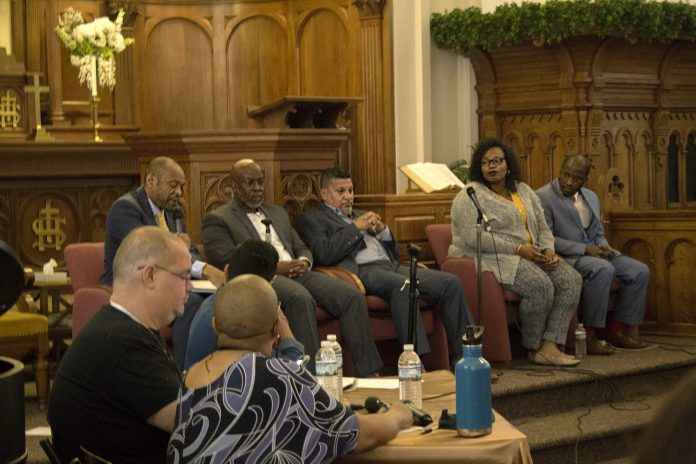
Crime, justice, rights, innocence, guilt, do-no-wrong, see-no-wrong and punishment. These are words that may (or may not) come to mind when considering America’s judicial system. All of these terms, though, refer to a sense of order and fairness; the law favors no individual above others, for it simply is. This is a very objective viewpoint in which law, state and government are on equal footing and levels of understanding. What it lacks, though, is the human element many say — or, to be frank, there is an untold (buried) reality of the situation. For many, the words that arise from considering America’s judicial system are oppression rather than justice, denial in the face of guilt, expectation over crime and punishment—well, that remains. Punishment, rather than being a case of justice, is often a case of systemic levels of control based not on action but rather the color of one’s skin.
On Oct. 22, Sunday afternoon to early evening, I was able to witness a meeting of mass importance and understanding, titled “Unpacking Mass Incarceration,” at the Resurrected Life Community Church in Allentown.
Mass incarceration is not simply a state of the country, nor is it ‘fair punishment’ by any means. It is not an accident or even new, but systematic and intentional genocide; mass incarceration is the human rights issue of the time.
Sponsored by the American Civil Liberties Union (ACLU) as well as POWER Northeast, the goal was to bring awareness to the Allentown community over the issue of mass incarceration.
The speakers featured were Mark Walters, Reggie Shufford, Brittany White, Dr. Hasshan Batts and Rev. Dr. Greg Edwards, all of whom spoke of both their personal encounters with mass incarceration as well as its historical context and how it plays a larger role in the justice system. The talk began with a series of frightening statistics that showed that an African-American man is more likely to end up in incarceration than a white man who committed the same crime. Various stories and experiences were told of the racial dynamic that is heavily involved in the process of imprisonment, yet this is continually ignored and denied by officials as ‘deserved’ punishment. Struggles behind and beyond jail bars were discussed and explained as a kind of life sentence no matter what jail time is given. Whether you’re in jail for two weeks or two years, once you are labeled a convicted criminal, it is near impossible for you to find a job. You are released on no income, with only the clothes on your back and a glance from your jailor who says, ‘See you soon’ as you leave. The time you pay doesn’t matter; our justice system runs based on punishment — not rehabilitation.
A similar line of dialogue continues as White describes the book “The Isis Papers”—specifically on its definition of ‘white supremacy.’ Rather than be defined as a ‘claim of the majority,’ it is explained as a case of minority type- cast and pseudo-name groups, who out- number and potentially overpower the self-proclaimed ‘white majority.’ White supremacy is a reaction to a shift in societal class; it is more of a case of fear and overcompensation than supremacy. Racism “is a universal operating system of white supremacy and domination in which the majority of the world’s white people participate,” as described in Dr. Frances Cress Welsing’s “The Cress Theory of Color-Confrontation and Racism” from “The Isis Papers.” What was further clarified by the speakers was the reality of the situation itself. Again, mass incarceration is not only intentional and consciously systematized, but it is further enforced with morals as well as asserted upon for profit.

Prisons themselves are an economy; private prisons specifically run on the incarceration of impoverished people. The poorer you are, the longer you’re in — it has nothing to do with the weight of the crime itself. A video titled “Adam Ruins Everything—the shocking way private prisons make money” has more information on this specifically, giving a clear overview of how private prisons started and why they are such an issue state and local wise.
The talk also brought up another issue of note that applies more to how certain individuals can help in the cause to end mass incarceration.
It is encouraged to disrupt the norm. Don’t be afraid to question a situation. At the moment, the greatest crime the majority of the ‘unaffected’ can commit is that of ignorance and, in turn, false assumption.
Lauren Mazur, member of the class of 2019, serves as the co-editor of the Arts & Culture section. Now a Junior, she is a double major in English and Music as well as a part of the Pre-Law program.





















